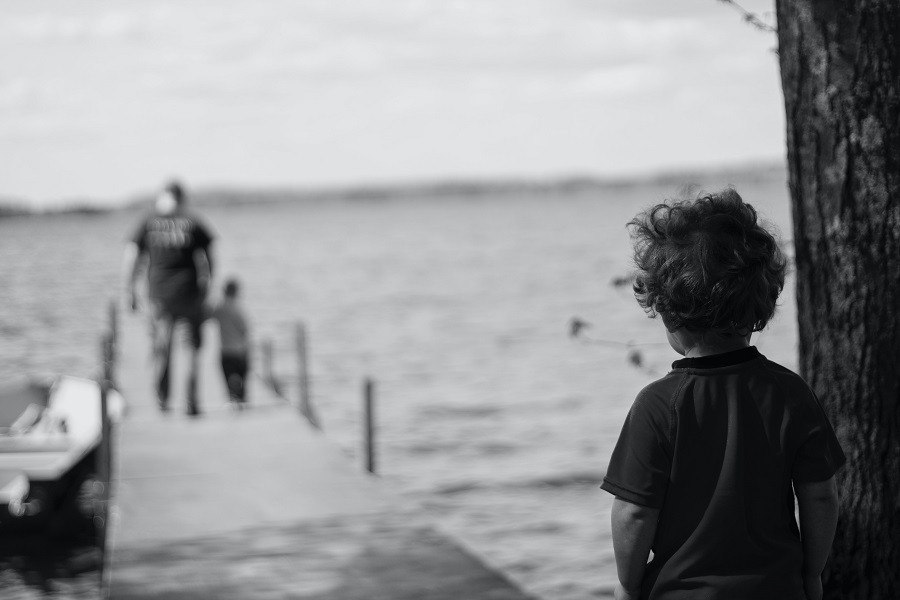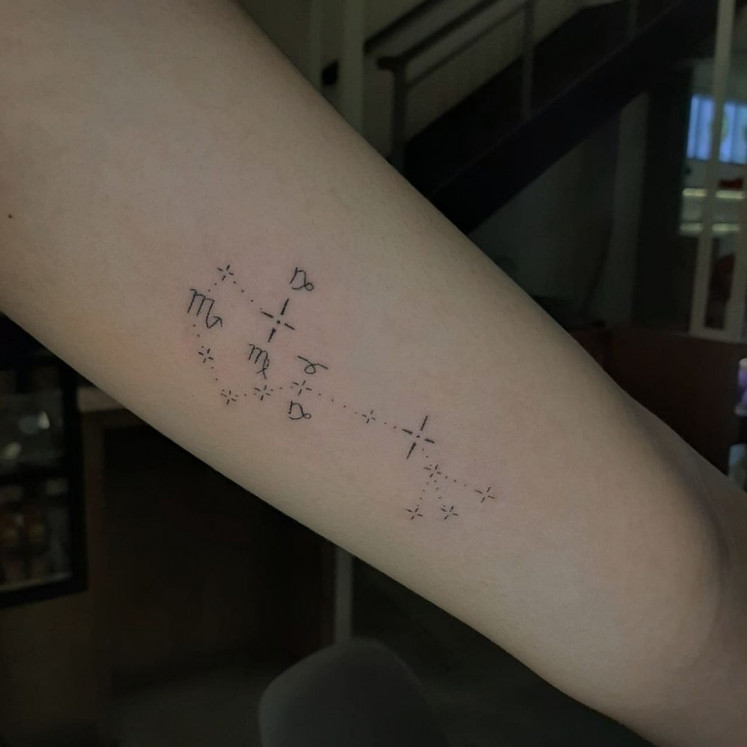Popular Reads
Top Results
Can't find what you're looking for?
View all search resultsPopular Reads
Top Results
Can't find what you're looking for?
View all search resultsFamilial taboo: stories of children who cut off contact with their parents
In Indonesian society, it is highly unusual for children to cut off contact with their parents. But for some, it was an inevitable decision.
Change text size
Gift Premium Articles
to Anyone
I
n Indonesian society, it is highly unusual for children to cut off contact with their parents. But for some, it is an inevitable decision.
Pychita Julinanda’s earliest memory was of her mother beating her. Julie, as she prefers to call herself, recalls that these waves of abuse would come at random. Perhaps her mother had just had a bad day at work, or an argument with a boyfriend. Most of the time, though, it was simply the result of Julie’s childhood petulance. She was young, confused and stubborn, so she saw the back of her mother’s hand.
“I would go to church every Sunday and pray for her to change,” Julie said. “I was in elementary school. I don’t think that’s what children should pray about.”
Now only 23 years old, her life story has taken many gloomy turns. But it has resulted in an outcome many Indonesians dread to even consider: in January 2020, Julie left home and has cut off all contact with her mother. She admits to having no clue where her mother is now and has no idea how she is doing. Reconciliation, she says, will not happen anytime soon. (Disclaimer: Julie has written for The Jakarta Post).
In a society that prides itself on its close parent-child relations and tight-knit communities, such a scenario remains rare. However, according to psychologist Sani Hermawan, these cases are becoming more common.
“Children might develop different values to their parents, but sometimes these two different ways of seeing the world can no longer coexist,” Sani said. “Some children also see toxic patterns in their family and exit the door before their lives are negatively affected.”
As these young people take stock of their lives and attempt to rebuild with whatever is left, their stories are left as cautionary tales.
A difficult childhood
Nyai, who refuses to divulge her full name, remembers a childhood of difficult realizations. When she was still in her third year of elementary school, her stepfather sexually abused her. Three years later, she found out her biological father had raped her mother and that she was born out of that assault.
It was a lot to take in for someone who was still a child. But for Nyai, this at least explained the lifetime of violence and cold treatment by her parents. Her erratic mother never truly healed from her own wounds and lived a life of frustrations and extramarital affairs.
“She was physically and emotionally abusive to all her children,” the 24-year-old said. “I had to protect my younger siblings and be a big girl for myself from an early age.”
Any attempt at confronting the state of affairs was met with ignorance at best, and hostility at worst. “When I was in high school, I confessed to my mother’s extended family that my stepfather had abused me,” she said. “They turned their backs on me and accused me of lying.”
Freedom: Pychita Julinanda escaped an abusive household – twice. Both times she ran off with only a few belongings, including this pair of white sneakers. (Courtesy of Pychita Julinanda) (Personal Collection/Courtesy of Pychita Julinanda)That moment of collective betrayal stayed with Nyai. “I no longer had any connection to my mother and stepfather or considered them as role models,” she revealed.
That inertia has constricted Julie all her life. She was raised by a single mother – her biological father had been “out of the picture” after an abusive marriage and a messy divorce – and both had survived dire times. “There were times when she would be very nice and close to me,” Julie said.
They gossiped, laughed and bonded over being two women forced to make it alone in a cold, harsh world. That was just one side of the coin, though. “Her attitude and treatment were very inconsistent,” Julie said. “Something random would set her off, then she becomes abusive. I would go to school with bruises and lie to my teachers.”
As she grew older, the abuse turned from physical to emotional. Her mother became “controlling”, getting angry when she did not regularly report to her throughout the school day and accusing her of favoring her friends over her when she asked to hang out or join extracurricular activities.
“When I was in high school, she found out I was dating someone secretly and she took away my phone for months,” Julie said. “It doesn’t just take away my entire life and means of communicating with my friends. All my school information, homework notes and photos were there. The consequences were dire.”
In contrast to Julie’s emotionally explosive household, Farah – who also refused to reveal her full name – came from a family that repressed their feelings. “I was a very anxious child and when I started school I was afraid my parents would leave me behind,” she said. “So they packed my bags in front of me while I cried and threatened to send me to an orphanage. I was six.”
They also had “a lot of deaths in the family”, which was shrugged off in typical fashion. “I wasn’t allowed to cry,” Farah recalled. “My Dad just said, ‘That’s not your mother, you can’t cry.’ So I never cried. I still haven’t been able to for the longest time.”
Those formative experiences created a pattern of unhealthy emotional implosion. “I still had a lot of those anxieties growing up and I couldn’t say anything,” Farah said. “I couldn’t tell them why I was worried because I didn’t know why. And instead of helping me through that, they just told me it’s not a big deal.”
Trigger for escape
As avenues of communication and basic trust crumbled, they began nursing thoughts of escape. Beyond that, though, was a more primal feeling: that home was no longer a safe place to be in. “The more I grew up, the more I felt like I needed to get out of the house,” Nyai revealed. “I had a strong urge to stay away.”
The early steps of adulthood at least provided some manner of release. Nyai went away to East Java for college, while Farah secured a scholarship to South Korea and later found work there. That time away from their families gave them much-needed breathing space and an opportunity to find themselves away from the constraints of home.
Julie, though, wasn't so lucky. She studied in the same city as her mother and found that despite her impending adulthood, nothing had really changed. “I became really frustrated,” she said. “I felt like I was missing out on a lot of things people were supposed to discover at that age. I felt like I was living in a cage.”
Everything finally set off in late 2017. Her mother caught her smoking, sent a broadcast message to all her friends demanding to know who “taught her to smoke” and left her with a black eye. “My whole life was crumbling in front of me,” Julie said.
Something had to give. Soon enough, she made her mind up and left the house for good, cutting off all ties with her mother in the process. As she rode off into an uncertain future, her only worldly possessions were some clothes, a laptop, one pair of shoes and Rp 1.2 million (US$83) in savings. She was afraid, scarred and broke, but at least she was free.
A thousand miles from home, Farah’s own facade of freedom was crumbling. Her relationship with her parents had deteriorated steadily during her years in South Korea and worsened further when she moved to the United States with her partner.
“No matter what I did in life, it wasn’t good enough because I chose to stay abroad and I wasn’t pious,” she says. Her life, as successful as it was, did not fit in with her parents’ narrow worldview, so nothing she did was appreciated and acknowledged. “They didn’t care about my development,” Farah said. “They just wanted me to come back and follow their rules.”
Tribute: After her separation from her family, Nyai made a hand-poked tattoo in tribute to her siblings. This remains her memento of home. (Courtesy of Nyai) (Personal Collection/Courtesy of Nyai)It seemed innocuous – a lack of approval, a stereotype, perhaps, of the gruff Asian parent – yet years of it ground Farah to powder. “I had achieved so much, made so much money and did so many cool things, and I couldn’t be happy with myself,” she said. “I didn’t think I was good enough to be anything. I don’t think I deserve basic happiness.”
With her sleep pattern ruined and her mental health failing, she began abusing painkillers. Then she resigned from a high-pressure job, the pandemic rushed through America and she had to go through the complicated process of extending her stay in a foreign country.
Things piled up and she could no longer juggle the strain of rearranging her life with keeping up with her family’s expectations. “I would have rather be alive and see them again rather than give up and die,” Farah recalled. “I don’t want to think about their opinion of my life. I just want to move forward and live.”
She cut off contact with her parents and fought to regain her dignity.
Worst day of her life
Nyai thought she had managed to wrangle some form of independence from her parents after she graduated college. She returned to Jakarta, found work and lived alone. At some point during in 2017 she came out to her mother as queer, and was pleasantly surprised by her warm acceptance. Things were tenuous, she said, but there was at least a delicate balance.
Everything shattered on a dramatic day in September 2020. “My mother asked if she could send some food over, so I shared my address with her,” Nyai said. What arrived, though, was the “worst day of her life.”
An army of relatives and unknown men pounded her door and forcibly dragged Nyai and her partner – a trans man – out of their beds. They were beaten up, verbally abused and physically assaulted. “I was dragged from the fourth-floor staircase all the way downstairs by my own mother,” Nyai recalled. “She clawed my arms. My arms and legs were blue. They pulled my hair out.”
The horrifying ordeal did not end there. After a tense ride home, she was taken to a pesantren in a remote village in Central Java. For two days, she was subjected to conversion therapy. “They bathed me and prayed over me,” she recalled. “There were my parents, my aunts and a lot of grown-ass people surrounding me, crying.”
“They told me to affirm my belief in God and drink something they had supposedly prayed over. I didn’t get any rest. They woke me up in the middle of the night and forced me to pray. They handed me a holy book and told me to hold it so I wouldn’t be afraid.”
She could not sleep, she could not eat and she was physically and mentally battered. Upon returning home, she found herself a prisoner. “They took away all means of communication,” Nyai said. “I was kept in a room and forbidden to go out, except to the bathroom. They even delivered food directly to my door.”
During this period, her mother made half-hearted attempts at reconciliation. “She cried and promised she would change, that she wouldn’t be the kind of parent she used to be,” Nyai said. “The next day, I found her slapping my youngest sister’s face. She wasn’t even eight years old.”
Then, things reverted to the unsettling normal. “One night, she sat me down and said: ‘I’m sick of taking care of you. You’re too wild,’” Nyai said, mimicking her mother. “‘We’re going to send you off to a pesantren and take your youngest sister with you. You’re both women, so teach her to be a pious woman.’”
After five days of confinement, she managed to sneak out a message to the outside world and escape with the help of friends. She’s thrifty about the details, but only because she’s still afraid of reprisals from her extended family. “I just want people to know that I’m out here,” she said. “I survived.”
A tenuous peace
Sadly, Farah said, separating from her parents was a good step for her. “I went to the gym, I met new people, I took time for myself,” she recalled. “I could do it all without the pressure of thinking that I would disappoint them.”
After her visa in the US was sorted out, she made up her mind to return to Indonesia and introduce her partner to her parents. “I wanted them to see that he’s a good person,” she said. “I told my brother I was coming back and he told my dad. My dad said, ‘Then they should get married, so when they come into my house, they are husband and wife.’”
It was a tall order, but Farah complied. Their first stop after checking out of a mandatory quarantine period was to their family home in the suburbs, where a small wedding ceremony awaited. “I hadn’t seen my parents for two years and hadn't spoken to them in a year,” Farah said. “The first time we saw and spoke to each other again was on my wedding day.”
Although it seemed a nightmare scenario, the process convinced Farah that their time away from each other had been beneficial. “They welcomed my husband to the family, they compromised with what I wanted in the wedding, and I saw that they treated my brothers differently,” she said. “They just loved us for being there. We can talk to each other and tell them things we are worried about now. There are more feelings.”
According to psychologist Sani Hermawan, in an ideal situation, the children eventually reach a compromise in values. “The relationship becomes more strategic,” she says. “Maybe they don’t see each other as often, it may become less personal, and there are set boundaries, but there’s a middle ground of mutual comfort that exists.”
For Farah, it was a case of both parties meeting each other halfway. “Parents should understand that their kids haven’t lived as long as they have, so a lot of the things that may not seem big to them will scare their kids to death,” she said. “You pushing us to be what you want is not going to work, because we’re not 55 years old. Stop expecting us to be better than who we truly are right now.”
On the other hand, she also had to take time to see things from her parent’s perspective. “Maybe the way they expressed their love was different to what I needed,” she reflected. “But it’s not easy to have that grace. Personally, I needed time away from them to realize that.”
For others, though, separation does not elicit change. After eight months on her own, a relative told Julie of a personal crisis her mother was facing and she was tempted to reconcile. They gradually rebuilt their relationship, and she moved back in with her mother after over a year in the doldrums.
“But she acted like nothing happened,” Julie said. “She didn’t apologize, so the atmosphere was tense. I still had to tiptoe around her. In December 2019, I told her I wanted to live on my own. She was angry, but I felt nothing had changed. I wanted my own space.”
She rented an apartment with friends and went away for a week-long trip to West Java, working and researching for her undergraduate thesis. “It was hectic, so I couldn’t call her all the time,” Julie said. “She bombarded me. She was [angry], and I was sick of her sense of entitlement. So I decided to walk away, once and for all. After West Java, I simply never came home.”
Her final separation left her in economic shambles. Most of her belongings – including her passport and laptop charger – were at home, and she had nothing but a few pieces of clothing, her phone, a laptop and one pair of shoes. Ironically, it was the very same pair of shoes she took on her first escape from home.
“I feel chronically empty,” Julie said. Since her second escape, she has been diagnosed with borderline personality disorder and untreated attention deficit hyperactivity disorder (ADHD) and struggles to function. “Most of my nightmares involve my mother. I have so much anger inside of me. I can’t think clearly, I’m dysfunctional. It’s difficult to build the pieces back together.”
Nyai also found herself struggling to rebuild her life. She found work in a company in Jakarta and continued her budding career as a model. But her security situation means she has a special provision in her contract that forbids her clients from revealing her location on the day of a photo shoot. “I don’t open windows anymore,” she says. “I still get scared when someone knocks on my door.”
Nyai has no interest in reconciling with her family, although she hopes one day to regain her relationship with her younger siblings. She speaks with barely concealed anger about her mother and the hell she made her live through. “I hate my mom now,” she says. “I don’t have any emotional consciousness for her. I can no longer cry for her. Her family made me feel like a prisoner.”
Living, at least for now, is a journey to regain what she lost. “I’m trying to carry on for the sake of life itself,” Nyai says. “I want to live for my loved ones and my dreams. I want to heal and be better than my parents. But I will take this anger within me forever.”













